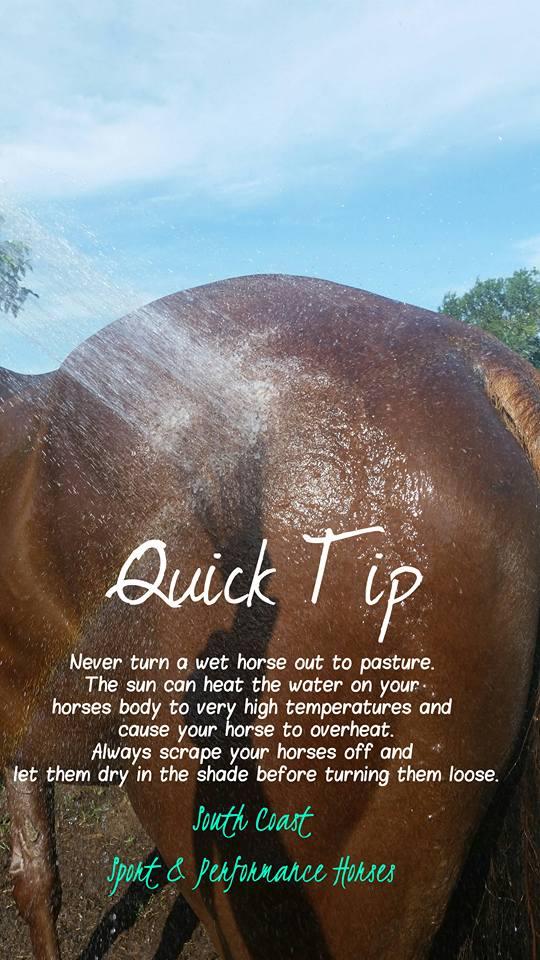
Fact Check Friday: ‘Don’t Turn Out a Wet Horse’
A viral Facebook meme warns horse owners not to turn out a damp horse after a bath or the sun will overheat the water. We do a little digging to bring you the whole story.
Happy #FactCheckFriday! In this column, we’ll try to track down the truth behind viral social posts that get the horse world in an uproar. Remember, kids: a healthy skepticism of stuff you read on the internet will get you far in life.
Today’s post is this viral meme that’s been shared a couple thousand times this week as a heat wave spiked almost nation-wide:
True or false? Answer: mostly true, but in specific circumstances. Let’s look a little closer.
The problem with memes or viral photos on social media is that there often isn’t enough room to really explain all of the circumstances, and as we all know in the horse world, there are very few hard-and-fast absolute rules.
The original post from South Coast Sport & Performance Horses has been edited a few times to reflect the specific scenario in which this “quick tip” is accurate, but most of the viral shares are of the image itself, and a lot of us are guilty of not reading all of the long text in a caption if we think we’ve got the gist from the text on a photo.
Let’s break down the facts in this meme:
- Never turn a wet horse out to pasture: when you hose off a hot horse after exercise, the water actually acts as an insulator, trapping heat in the horse’s body. To properly and safely cool out a horse, he should be scraped as quickly as possible after hosing, and if the horse still feels hot, the entire process should be repeated as much as needed to bring his temperature down to normal. A horse should never be hosed off and simply left to drip-dry.
- The sun can heat the water on your horse’s body and cause him to overheat: as above, a thin layer of water left on your hot post-exercise horse, especially in a humid climate where he may not dry quickly, acts as an insulator and the horse’s body heat can be trapped. Combine this with hot direct sunlight and you have a recipe for overheating.
- Always scrape your horse and let him dry in the shade: as above, it’s the scraping-off process that allows the horse to actually cool down. Hand-walking in the shade or standing in a shaded breezy area if his respiratory rate and pulse have slowed to normal allows him to dry off and cool down quickly before you turn him back out into the sun, especially in humid areas where he may not dry off quickly otherwise. Even in high humidity, scraping does a lot to help expedite the process.
But what if…
…your horse is out in a rainstorm and gets wet, and then the sun comes out? Your horse will most likely be fine — again, this “quick tip” is intended for post-exercise horse care, where a horse’s temperature is elevated and he is warm to the touch. A horse at normal temperature is at less risk for overheating if he gets wet.
…you have a mister system? A mister system gets a horse lightly damp, not soaked to the skin like a post-ride hosing down. The evaporation of the mist on the horse’s skin keeps him cool.
…you live somewhere that it’s dry and your horse dries out quickly? If you’ve hosed and scraped your horse, he’s cool to the touch and you’re already starting to see dry patches on his coat because your climate is so dry, you can turn probably him out. My particular corner of Horse Nation falls into this category, depending on daily conditions — usually by the time I’m done hosing, scraping, putting up my tack and getting my horse’s bell boots and fly mask back on, then walking him way out to the pasture, he’s starting to dry out on his own even if it’s sunny.
The bottom line: yes, this meme is accurate — in specific scenarios. In hot, humid conditions, simply take your time in cooling down your horse after exercise, make sure you’re hosing AND scraping as much as you need to, and allow that horse a little time to dry off in the shade before he goes back out into direct sun.
Stay safe and cool out there, Horse Nation — and go riding!






Leave a Comment